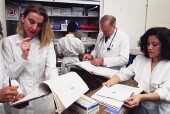- 10 Strategies to Overcome Insomnia
- Could Artificial Sweeteners Be Aging the Brain Faster?
- Techniques for Soothing Your Nervous System
- Does the Water in Your House Smell Funny? Here’s Why
- Can a Daily Dose of Apple Cider Vinegar Actually Aid Weight Loss?
- 6 Health Beverages That Can Actually Spike Your Blood Sugar
- Treatment Options for Social Anxiety Disorder
- Understanding the Connection Between Anxiety and Depression
- How Daily Prunes Can Influence Cholesterol and Inflammation
- When to Take B12 for Better Absorption and Energy
Many Doctors Admit Difficulty in Treating Unexplained Stroke: Poll


More than half of American doctors do not feel confident that they can spot the reason for a stroke that strikes in the absence of a clearly established cause.
The poll, conducted by the American Heart Association (AHA) and the American Stroke Association (ASA), involved more than 650 neurologists, cardiologists, hospitalists, primary care physicians and stroke coordinators.
The survey questions focused on the degree to which such medical professionals felt adequately informed about so-called “cryptogenic strokes,” which are strokes that remain unexplained even after comprehensive testing.
“The ability to discern the causes of cryptogenic strokes has profound implications for preventing secondary strokes and improving patient outcomes,” Dr. Mary Ann Bauman, chair of the American Stroke Association’s advisory committee, said in an AHA/ASA news release.
Bauman added that improving current preparedness to handle such strokes is “likely to require educating health care providers and the scientific community about cryptogenic stroke, appropriate work-up, applicable studies and outcomes.”
Bauman said that stroke is currently the fifth-leading cause of death in the United States, and a leading cause of severe and long-term disability.
Every year, about 200,000 Americans experience a stroke that seems to elude explanation, the researchers added.
Possible underlying causes can include an intermittent and hard-to-detect irregular heartbeat (atrial fibrillation), a blood clot disorder and/or a hole in the heart’s upper chambers, according to background information in the news release.
But the poll revealed that between 51 percent and 70 percent of the respondents do not feel confident that they know exactly which steps are best to take to be able to pinpoint exactly which cause might be at play for a particular patient.
The survey results were to be reported Friday at the AHA/ASA-sponsored Cryptogenic Stroke Public Health Conference, in Washington, D.C.
Research presented at meetings is considered preliminary until published in a peer-reviewed journal.
More information
The AHA/ASA has more on unexplained strokes.
Source: HealthDay
Copyright © 2026 HealthDay. All rights reserved.










